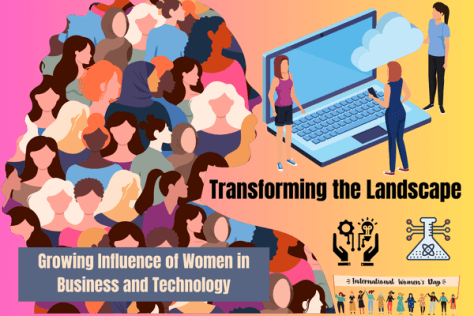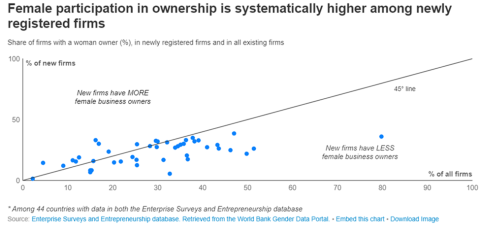While there are challenges and issues to be addressed, women in the technology sector working as professionals, startup founders and decision makers, are making crucial contributions.
In the contemporary landscape of business, technology, and management, women have become a compelling force, intricately weaving themselves into the fabric of entrepreneurship, diversity, and innovation. As science, technology, and innovation continue to impact their transformative journey, offering both opportunities and challenges, women across the globe find themselves at the nexus of newfound freedoms and evolving risks. March 8th is celebrated as the International Women’s Day and in 2024, the theme is Invest in women: Accelerate progress. UN says, ‘Investing in women and championing gender equality turbocharges a future where everyone in society can thrive, creating a world of boundless opportunity and empowerment for all”.

When more women work, economies grow and closing gender gaps in employment could boost GDP per capita by 20 per cent, according to World Bank report titled Women, Business and the Law Report 2024. Closing the gender gap could give the global economy a USD 7 trillion boost, a study by UN-Women observes.
Women in Tech: Catalysts for Change
While there are challenges and issues to be addressed, women in the technology sector both as professionals, startup founders and with their participation in the leadership level are making crucial contributions. In the realm of technology, women stand as catalysts for transformative change. Their increasing presence not only addresses critical talent shortages but also contributes valuable diversity of insight, fostering innovation and problem-solving within tech teams. At the firm level enhanced women participation at the leadership roles, have shown to “increase organizational effectiveness and growth and businesses with three or more women in senior management functions score higher in all dimensions of organizational performance, according to UNWomen.
However, challenges persist, with women comprising only 29.2% of STEM workers, facing hostile work environments and systemic gender bias, according to Global Gender Gap Report 2023, World Economic Forum. Despite these obstacles, women in tech play a pivotal role in the ongoing digital revolution, shaping societal norms, and ensuring technology developments cater to the needs of the entire population. Recognizing their impact, efforts to address challenges, foster inclusivity, celebrate successes, and dismantle legal barriers are crucial for creating a more equitable and thriving tech ecosystem.
Increasing Tech Talent Pool
The imperative of adding more women to the workforce extends beyond merely filling talent shortages in tech fields; it is a strategic move that enriches the industry with diversity, innovation, and enhanced problem-solving capabilities.
In this digital age, the demand for STEM graduates far exceeds its supply. This disparity in professional choices reflects a missed opportunity. Encouraging more girls into STEM can help fill the supply gap.
Recognizing the unique perspectives and skillsets women bring, their contribution goes beyond numerical representation, acting as a catalyst for a more dynamic and inclusive tech landscape. As women take on roles within tech teams, their diverse insights not only address critical challenges but also foster a culture of innovation, creating a collaborative environment where a variety of viewpoints lead to more comprehensive and effective solutions. This symbiotic relationship between increasing female participation and fostering innovation becomes a key driver for the continued growth and success of the tech industry.
Women in leadership position
Based on data & a study report from the World Economic Forum, it would be interesting to observe that “share of women in senior leadership positions such as “Director, Vice-President (VP and other C-suite executives stands at 32.2% in 2023 nearly 10 percentage points lower than women’s overall 2023 workforce representation of 41.9%.
Digital Revolution and Its Impact
While technology unfolds new freedoms and opportunities, it concurrently introduces challenges that require a nuanced approach for inclusive societal progress. The transformative power of technology, though liberating, comes with inherent risks, particularly concerning safety and the reinforcement of gender inequalities. It becomes paramount, therefore, to approach technological advancements with caution, ensuring that the benefits are distributed equitably across all segments of the population. By navigating the evolving technological landscape judiciously, there is an opportunity to mitigate potential threats and proactively address gender disparities, fostering a future where technology acts as an inclusive force for societal well-being. Balancing innovation with a commitment to social equity becomes essential in harnessing the full potential of technology for the betterment of diverse communities.
It is interesting to note that there is a growing trend in startups that female participation in ownership is systematically higher among newly registered firms globally, as per data collected from across 44 countries (World Bank, 2023).
The Promise and Challenges in STEM
Despite strides in various fields, women’s representation in STEM occupations remains disproportionately low, constituting only 29.2% of the workforce. This imbalance is compounded by the persistence of hostile work environments, posing significant obstacles to the career longevity of women in STEM.
STEM education is the key foundation for girls and women. Technical education and skills development at all levels, from primary school to academic education and life-long learning, are needed more than ever before. Girls and women need to be given the opportunity to get well-educated and highly trained in new technologies during the entire learning path, but also, more importantly, in the values associated with using those technologies.
Positive Change in Science: A Catalyst for Gender Equality
Amidst these challenges, the promise of science emerges as a potent driver for positive change in gender equality. Recognizing the transformative potential of science, efforts must be directed towards enhancing the representation and retention of women in science and technology sectors. Beyond being a matter of social justice, this inclusivity is essential for fostering creativity and ensuring the long-term profitability and sustainability of these critical industries. Embracing diversity in these fields is not only a moral imperative but also a strategic decision for advancing innovation and progress.
Women Tech Business Founders: A Rising Trend
Female-founded and female-led startups are becoming more commonplace, but still only account for a small fraction of startups worldwide, according to a report titled Female-founded startups worldwide. “Women found 20% of tech startups in the world. Within the dynamic startup landscape, a notable and encouraging trend is emerging — a surge in startups with higher female ownership on a global scale. Concrete evidence from data collected across 44 countries underscores a systematic increase in female participation in startup ownership,” says the EoY Diversity Report 2019.
This shift reflects a transformative momentum, breaking traditional barriers and providing women with unprecedented opportunities to lead and shape the entrepreneurial landscape. As the entrepreneurial ecosystem embraces diversity, these trends not only signify progress but also hold the potential to reshape industries, foster innovation, and contribute to a more inclusive and equitable global business environment. This evolution in the startup landscape highlights the instrumental role women are playing in driving entrepreneurial ventures and contributing to economic growth on a global scale.
Increased Access and Shifting Norms

A notable shift is underway as more women actively pursue education in STEM fields, challenging traditional norms and breaking down barriers that have historically hindered their participation. Simultaneously, there’s a noteworthy transformation in the funding landscape, with women gaining access to venture capital that has traditionally been dominated by men. This dual momentum reflects a positive trajectory toward gender inclusivity, providing women with the resources and opportunities necessary to thrive in STEM careers and entrepreneurial pursuits.
In tandem with increased educational opportunities and access to funding, there is a positive shift in societal norms regarding female entrepreneurship. The prevailing attitudes are becoming more supportive, creating an encouraging environment for women to pursue entrepreneurial ventures. As societal perceptions evolve, the narrative around female-led initiatives is changing, further dismantling gender stereotypes and fostering a culture that recognizes and values the contributions of women in the business and entrepreneurial spheres. This cultural transformation aligns with the broader goal of creating an inclusive and supportive ecosystem for women in their professional pursuits.
Economic Growth: The Significance of Female Tech Founders
The influence of female tech founders extends beyond individual success, playing a pivotal role in contributing significantly to economic growth and job creation. Their entrepreneurial endeavors not only generate economic value but also stimulate innovation and foster a thriving business ecosystem. Recognizing the economic impact of women in tech is crucial for shaping policies that support and encourage their participation, further solidifying their role as key drivers of sustainable economic development.
Role Models and Diverse Solutions: Catalysts for Innovation
The success of women in tech serves as a powerful source of inspiration, paving the way for future generations. By breaking down gender barriers, these women become influential role models, encouraging others to pursue their entrepreneurial dreams within the tech industry. This influence contributes to a richer and more diverse landscape of solutions, particularly in critical sectors such as healthcare, education, and sustainability. The varied perspectives and approaches brought forth by women in tech lead to a wider range of innovative solutions, addressing complex challenges and ultimately contributing to the betterment of society as a whole.
Challenges and Opportunities
Gender Bias and Funding: Despite advancements, women continue to grapple with systemic gender bias and encounter diverse challenges in their respective fields.
Building robust support networks and mentorship programs is another fundamental necessity for the success of female founders in the tech industry. Mentorship provides a platform for guidance, knowledge transfer, and networking opportunities, empowering women with the skills and insights necessary to navigate the complexities of the business world. Cultivating a culture that encourages mentorship and support is essential for bridging gaps, fostering professional development, and paving the way for sustained success among women entrepreneurs.
Highlighting the achievements of successful female tech founders is not merely a celebration of individual accomplishments; it is a strategic step in inspiring and empowering future generations. By showcasing these success stories, the tech industry can challenge stereotypes, break down barriers, and encourage more women to pursue careers in technology and entrepreneurship. Celebration becomes a powerful tool for driving cultural change, promoting inclusivity, and establishing a narrative that encourages the full and equal participation of women in the tech sector.
Conclusion
In the evolving landscape of business and technology, the increasing influence of women is reshaping entrepreneurship, diversity, and innovation. While the digital revolution brings opportunities, gender disparities persist, particularly in STEM fields. The significance of women in tech is undeniable, contributing diversity and driving innovation. However, challenges such as funding gaps and gender bias remain. The rise of women-led startups signals progress, but concerted efforts are needed to address barriers and celebrate successes. By fostering inclusivity, supporting mentorship, and tackling legal constraints, we can propel a more equitable and innovative future for women in business and technology.





